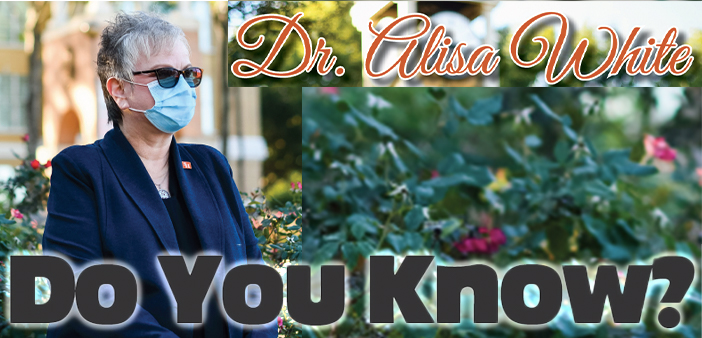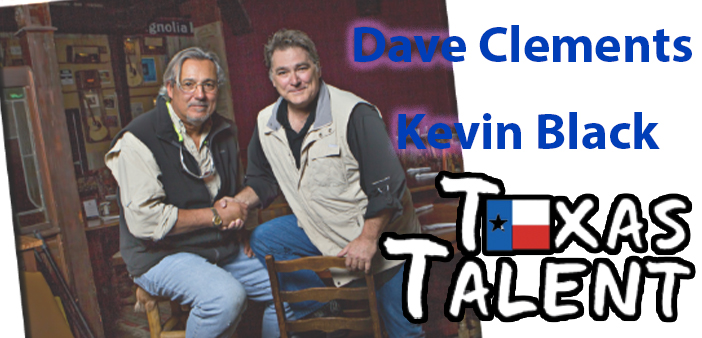Photos by Libby Rogers
“…it burst into flames, and I was ready to run! I watched her nerves of steel as she calmly walked over, picked it up and put it in the sink, and then said to myself, ‘I want to be like that!’”
Meet Dr. Darren Williams, Professor of Physical Chemistry at Sam Houston State University, who, likewise, has conquered many a challenge over his 20 years of teaching and encourages his students to do the same. Let’s get to know this remarkable member of our community.
Please share a bit about your early years and what led you into the field of chemistry.
I enjoyed my early years growing up in Ft. Worth, Texas, where my older sister and I, along with our friends, ran around the stockyards, enjoyed the music scene and lived a typical small-town life one can easily compare to life in Huntsville. We knew our neighbors and could safely trick-or-treat from house to house on Halloween and enjoyed these types of family traditions. I have many wonderful memories from those years.

I was given a chemistry kit at an early age, and my friends and I would experiment, making color changes and concocting an unending array of potions from our home medicine cabinets. Never a dull moment! As a sophomore in high school, I found the only class I really had to study for was chemistry. This was the only class that presented a challenge to me, and I liked being challenged in this way.
I had an excellent chemistry teacher that year, Mrs. Blackmon, and I discovered she was calm under fire. We were making inorganic acid one day in the lab and had produced pure oxygen in three bottles. Our plan was to burn sulfur, carbon, and phosphorus in the bottles. As she retrieved a bottle of phosphorus for the experiment, she remarked that we were not to open or extract the chemical with a metal utensil, but to be extremely gentle with the contents. She placed phosphorus on a watch glass for one of the students, who then picked it up, walked to his work area, and unceremoniously plopped it down on the countertop. It burst into flames! Mrs. Blackmon never broke a sweat. I watched her nerves of steel as she calmly walked over, picked it up and put it in the sink, and then said to myself, “I want to be like that!” That was a turning point for me. I was smitten with a love for chemistry! I discovered, too, that as I studied and understood the content, that older students were coming to me for help. This was a confirmation of sorts, that I was in a field of study that was right for me, and my confidence level soared.
Give us a brief history of your collegiate and graduate years of study.
I attended the University of Texas just as my mom and grandparents had and earned a Bachelor of Science Degree in Chemistry. It was there that I met my future wife, Jennifer. We both played trumpet in the Longhorn Band. In fact, our two children, Katy and Thomas, were both trumpet players in the Huntsville High School band. Katy graduated two years ago, and Thomas graduated this year.
I had never really considered a career in teaching until, after reviewing the results of a personality test that indicated teaching as one of my strong points and having this confirmed by friends, I knew this would be a logical career choice for me. I also knew teaching at the collegiate level would be optimal for me. This meant that graduate school and a Ph.D. were in order. In researching graduate schools, I fell in love with the Pacific Northwest area of the United States, and I decided to attend Oregon State for my doctoral work. My five years there included the four-year degree with a year of trout fishing worked into the mix! It was my only respite from the heavy study load and endless challenges required for earning a Ph.D.
In graduate school, you hit the wall. You are pushed and pushed hard in your studies, and sacrifices must be made to make your goal a reality. During those four years, I missed all the movies, concerts, and popular music and concentrated only on my one goal. Graduate school is not a smart move if you are not committed to it. You must have the motivation to finish it. Fishing did help!
How did your career develop after obtaining your Ph.D. in Physical Chemistry?
We longed to be back home in Texas, but without a post-doctoral study, it was slim pickings on a job. I landed a teaching job at West Texas A&M University in Canyon, Texas, as an assistant professor. We were there from 1997-2001. We loved this area! Great place and great people! Jennifer made friends with several other moms who had young children, and they would stroll to the Sonic, then deliver drinks to us at the university. It was the small-town life that we longed for.
In 2001, a job came open at the Pantex plant in Amarillo. This is part of the U.S. Dept of Energy and is responsible for the support, refurbishing, and dismantling of nuclear weapons. My job as a chemist in the analytical lab was to analyze explosives and things that go into those systems. It was an interesting job and helped increase my resume with more impressive items, making me more competitive in the job market. One of the most valuable lessons I learned at Pantex was how good companies invest in training for their employees. They sent 76 of us to Six-sigma Blackbelt training on process improvement. It was very expensive for them and, when we graduated, they said, ”Okay, we spent this much, now go save us more than that.” I’m proud to say that, in the next year, I more than paid for my training in savings to the company. This industrial experience at Pantex enabled me to apply chemistry to real-world applications and benefitted me in landing a faculty position at SHSU in 2004. We are closer to our families here, and the chemistry department is well-supported. We love it here, and I have been very satisfied at SHSU.
What courses do you teach at SHSU, and what advice do you have for new students?

I teach Physical Chemistry (every year), Forensic Chemistry (every spring), General Chemistry (every year, when not teaching graduate courses), Graduate Statistical Thermodynamics (every 3rd year), Graduate Quantum Mechanics and Spectroscopy (every 3rd year), and Chemistry (for non-majors; only occasionally).
We have a lot of first-generation students, as well as many who are taking classes and working. Both situations provide challenges for both students and faculty, especially in the first year. The key to success is guiding the students into the mindset that college is not supposed to be easy, that it should be a challenge that changes them, gives them skills, and makes them better. Once they are inspired in this way, then they are ready to work hard and do more than they thought possible. We have had some wonderful success stories of graduates who have gone right into jobs where they have advanced quickly, have gotten patents, and have done some very innovative things.
Please describe and share information on the Cleaning Research Group.
This type of cleaning has to do with removing all contaminants that would affect the long-term storage of or integrity of a device or piece of equipment. While at Pantex, where the dismantling and storage of nuclear weapons was accomplished, it was of utmost importance that corrosion was prevented. This same goal is applied to devices in the medical field, such as a replacement hip, and to electronics such as computer discs. Contamination in any of these devices could be harmful and dangerous. My student researchers and I continue to work on solutions and procedures to meet these goals in medical, aerospace, and electronics.
You are Director and Faculty Advisor for Ratio Christi. Enlighten us! Describe the mission and goals of this group.
I enjoy getting into great conversations about life and deep spiritual matters with my students. Ratio Christi is Latin for “Reason for Christ,” and is about the rational support of the Christian faith. We start from the outside and take questions that the world is asking such as, “How do we know if there is a beginning of the universe?” and “What evidence is there for it?” During a recent session, we discussed beauty, why we crave it, and why helping someone is a beautiful act. We meet online each Tuesday night through Zoom, and it is open to the public.
Does your busy life include room for hobbies?
Of course! Our family loves the woods and to camp and hike. And I enjoy photography. I recently did some videos of a young fox family romping and playing in the yard. This is posted on YouTube: “The Foxes of Turtle Creek.” Huntsville is a beautiful area for our hobbies and small-town living!
Do you have some last words of wisdom for young people?

I think it is important for students entering college to be prepared for hard work, tough challenges, and to know that second chances are expensive. It is better to prepare than to react. Be prepared to change! If a student graduates from the university the same person who entered, then we haven’t done our job, nor have they! Challenges that have been tackled head-on and conquered will render one’s self a better person with the skills to succeed in life. A quote by the great Yogi Berra on one of Dr. Williams’ websites is as follows: “ You’ve got to be very careful if you don’t know where you are going because you might not get there.” It is clear, Dr. Williams, that setting goals, committing oneself to these goals, and meeting the challenges along the way is advice you give that should be heeded not only by new students but by anyone of any stage in life! Thank you for an inspirational interview! Dr. Williams may be reached by email: williams@shsu.edu.



